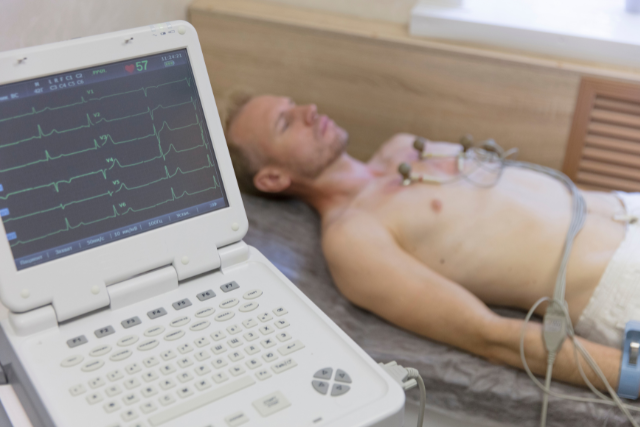Electrocardiogram (ECG)
An Electrocardiogram (ECG) is a fundamental diagnostic test that measures the electrical activity of your heart. This painless and non-invasive procedure involves placing electrodes on your chest, arms, and legs. These electrodes record the heart’s electrical impulses, providing essential information to evaluate the heart’s rhythm and detect any abnormalities or irregularities. ECG is like a snapshot of the heart’s activity, aiding healthcare professionals in assessing various heart conditions, such as arrhythmias, heart attacks, and other heart-related problems.
Which doctor to consult after ECG?
Following an ECG, it is advisable to consult with a cardiologist. Amrit Heart Care Hospital offers access to experienced and best cardiologists in Sikar specializing in cardiac science. After the ECG test, the cardiologist will interpret the results, provide insights, and offer guidance on further steps or treatments if necessary.

Know the procedure
Pre-Test Preparation: Before the ECG, you’ll be guided to a comfortable, private room where a trained technician will explain the procedure. You’ll be asked to remove any clothing covering the areas where the electrodes will be placed, typically the chest, arms, and legs.
Electrode Placement: The technician will meticulously clean the areas where the electrodes will be attached to ensure a good connection. Electrodes, typically 10 in number, are placed on specific spots on your skin using adhesive patches. These electrodes are connected by wires to the ECG machine, which records the heart’s electrical activity.
Recording: You will be asked to lie still on an examination table while the machine records your heart’s electrical activity. You need to simply relax, breathe normally, and avoid talking or moving during the test to minimize any interference with the recording. The entire process usually takes a few minutes to capture the necessary information.
Post-test & Reports: Once the ECG recording is completed, the technician will remove the electrodes and clean any residual gel or adhesive from your skin.
The results are usually shared with the patient on the spot or to the referring cardiologist/physician, along with recommendations or further steps to be taken, if necessary.
When is ECG advised?
An ECG is recommended in several scenarios. If you experience chest pain, it could signal an underlying heart problem or heart disease. Under such circumstances, an ECG is very crucial to identify the cause of the pain and assess the heart’s condition. Additionally, if there is suspicion of heart disease or to rule out the possibility of a heart attack (myocardial infarction also known as MI), an ECG is a valuable tool for diagnosis.
